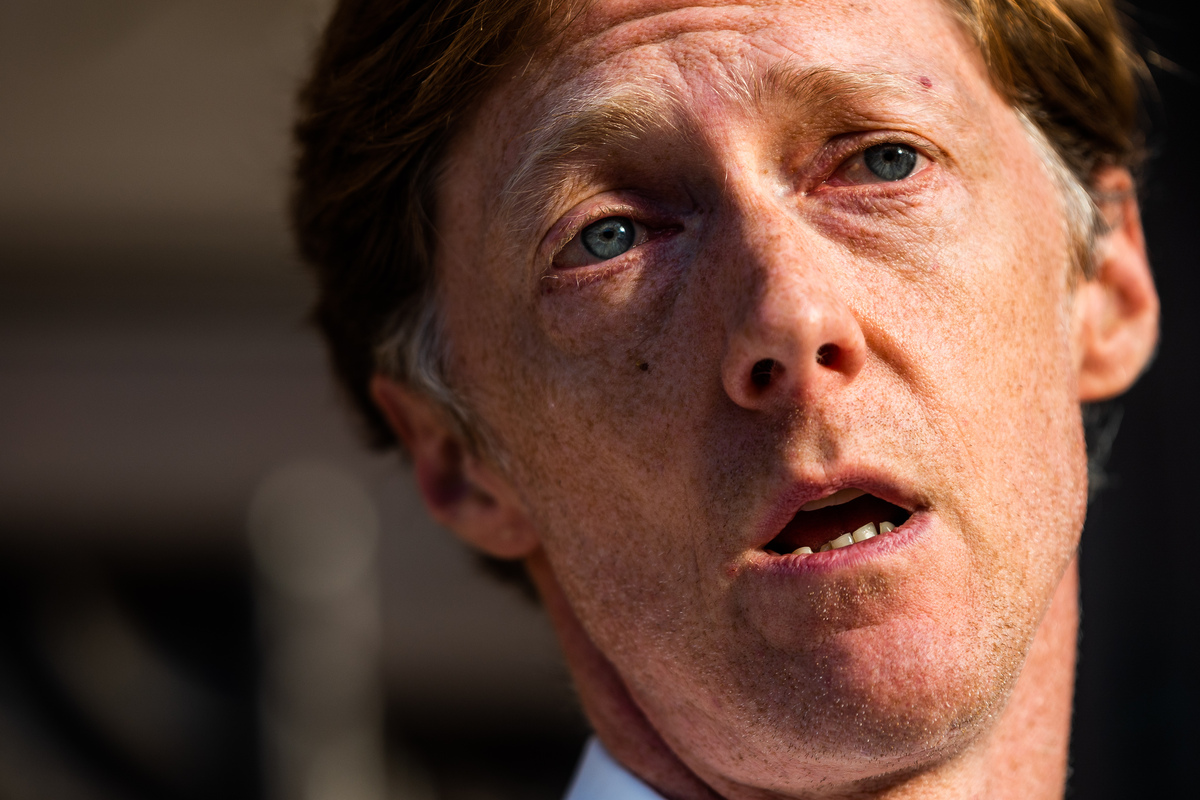Mayor Justin Elicker Speaks at Yale Democrats Forum
Mayor Elicker spoke about the successes and challenges of his first term in the Mayor’s Office.

Lukas Flippo, Senior Photographer
On Friday, Mayor Justin Elicker spoke at a meeting of the Yale College Democrats about his term as mayor, his successes, regrets and plans for the future.
After an unsuccessful mayoral bid in 2013, Elicker was elected in 2019, after defeating three-term incumbent, Toni Harp. During his first term in office, Elicker has had to confront COVID-19, a budget crisis and racial and economic inequity.
This year, Elicker will be up for reelection, facing “a serious Republican challenger,” according to his campaign fundraising email. Elicker’s opponents are Republican nominee John Carlos and Independent Mayce Torres, formerly a Democratic and Republican candidate, who changed her party affiliation after she failed to gain traction in the Democratic and Republican primaries. Carlos is the first Republican running for mayor since 2007. As he seeks a second term, Elicker ran through a number of the issues that are on voters’ minds at Friday’s forum such as the city’s longstanding budget issues, addressing the ongoing pandemic and police brutality.
“Those individuals and entities that have the power and the resources to do so need to be at the table,” Elicker said at the event. “New Haven cannot resolve its problems on its own. … Average citizens are paying much more as a percentage of their income to the city than the university.”
Yale President Peter Salovey previously expressed Yale’s interest in paying more money to New Haven, but has stopped short of offering a specific amount or timeline. So far this year, Yale has contributed $13 million to New Haven’s budget, $1 million more than the previous year.
Elicker said that he and his team have “spent a lot of time trying to find common ground, trying to build trust.” He added that he is “optimistic that when [Yale and City Hall] reach the finish line, Yale will increase its contribution to the city.”
During his 2019 campaign, Elicker made New Haven’s financial woes and Yale’s role in that problem a centerpiece of his candidacy. He said that he entered office facing an “incredible deficit [from the city’s] pension and debt service payments.”
During his term, Elicker said that his administration “worked very hard with [their] state delegation to change the way the state provides funding to the city,” in order to balance the budget. Ultimately, the state’s contribution to New Haven’s budget went from $41 million to $90 million.
Elicker entered office in 2020, just prior to the beginning of the pandemic. According to Elicker, unlike in some cities, New Haven “overwhelmingly accepts the science, follows the guidelines, puts on masks [and relative to other cities, New Haven] is doing well.” During his tenure, Elicker has implemented indoor mask mandates, and starting Monday, Sept. 27 a vaccine-or-testing mandate for city employees will go into effect.
In addressing COVID-19, Elicker described that City Hall was also forced to confront income inequality. He said that at the beginning of the pandemic, residents could only get tested for COVID-19 in a car and touted the fact that New Haven was the first place in Connecticut where testing was available to pedestrians.
In a more vulnerable moment during the forum, Elicker discussed his regrets. Since the start of 2021, the New Haven Police Department said that New Haven has experienced an increase in violent crime.
“The violence in the city is something that is just heartbreaking,” Elicker said. “I can’t tell you how many funerals I’ve gone to. How many families I’ve called who have lost their children. How many homicide scenes I’ve gone to. We are doing everything we know how to do, and it doesn’t feel like it’s getting better.”
According to Elicker, “one of the greatest mistakes” he has made was during a Black Lives Matter protest last summer. In the summer of 2020, body camera footage of New Haven police macing and tackling a man suspected of shoplifting at Walmart went viral. In response to a vindication of the officers, a group of about 70 protesters chanted outside of Elicker’s house.
Elicker said that at the time he talked to the protesters outside of his house but he went back inside because they screamed at him. At around 1:30 a.m., Elicker said he told the police to tell them to leave. He told the College Democrats that he should have let the protesters continue their demonstration. He added that he believes that if he had stuck out the screaming, the group would have had a constructive conversation with him. Elicker said that this was a moment that has stuck with him and that, since then, has practiced “sticking it out.”
“In the end, especially in a small city, we all know each other. We live near each other. We’ll run into each other again.”
New Haven citizens will vote in the mayoral election on Nov. 2.







